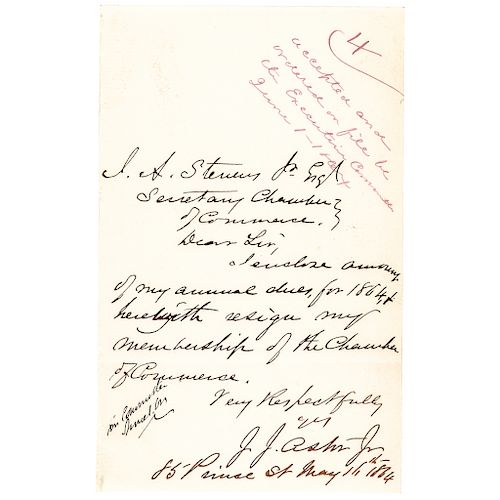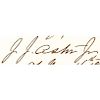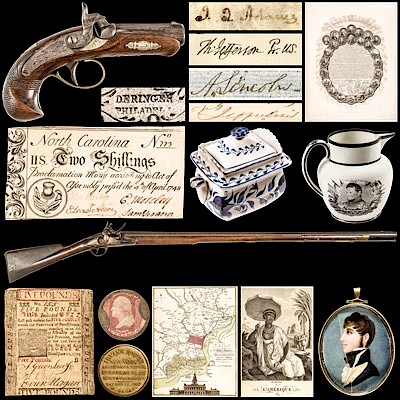1864-Date Civil War period General JOHN JACOB ASTOR JR. Autograph Letter Signed
Lot 3
Categories
Estimate:
$1,000 - $1,200
Absentee vs Live bid
Two ways to bid:
- Leave a max absentee bid and the platform will bid on your behalf up to your maximum bid during the live auction.
- Bid live during the auction and your bids will be submitted real-time to the auctioneer.
Bid Increments
| Price | Bid Increment |
|---|---|
| $0 | $10 |
| $200 | $20 |
| $300 | $25 |
| $500 | $50 |
| $1,000 | $100 |
| $2,000 | $200 |
| $3,000 | $250 |
| $5,000 | $500 |
| $10,000 | $1,000 |
| $20,000 | $2,000 |
| $30,000 | $2,500 |
| $50,000 | $5,000 |
| $100,000 | $10,000 |
| $200,000 | $20,000 |
| $300,000 | $25,000 |
| $500,000 | $50,000 |
About Auction
By Early American History Auctions
Oct 19, 2019
Set Reminder
2019-10-19 12:00:00
2019-10-19 12:00:00
America/New_York
Bidsquare
Bidsquare : Historic Autographs-Currency-Political-Americana-Militaria-Guns
https://www.bidsquare.com/auctions/early-american-history-auctions/historic-autographs-currency-political-americana-militaria-guns-4513
326 Lots of Rare, Historic Autographs, Americana, Civil War Era, George Washington, Abraham Lincoln, Black History, Revolutionary War Era, Colonial America, Federal Period, War of 1812, Colonial Currency, Indian Peace Medals & more... Early American History Auctions auctions@earlyamerican.com
326 Lots of Rare, Historic Autographs, Americana, Civil War Era, George Washington, Abraham Lincoln, Black History, Revolutionary War Era, Colonial America, Federal Period, War of 1812, Colonial Currency, Indian Peace Medals & more... Early American History Auctions auctions@earlyamerican.com
- Lot Description
Autographs
John Jacob Astor III Resigns New York Chamber of Commerce
JOHN JACOB ASTOR III (1822-1890). American Financier, Philanthropist and Union Soldier becoming a Civil War Brevet Brigadier General.
May 16, 1864-Dated Civil War period, Autograph Letter Signed, "J. J. Astor Jr.," 1 page, measuring 4" x 6.25", Choice Extremely Fine. This is an important Civil War Period Document being the rare signature from one of America's wealthiest family of early financiers. John Jacob Astor III (June 10, 1822 - February 22, 1890) was an American financier, philanthropist and a Union Brevet Brigadier General during the American Civil War. He was a prominent member of the Astor family, becoming the wealthiest family member in his generation and the founder of their English branch. This bright, fresh appearing Letter accompanied Astor's submission of his annual dues for 1864 to the (New York) "Chamber of Commerce" as well as resigning his membership therefrom! Original folds but otherwise very nice. A short notation in red in the upper right states: "Accepted and ordered on file by the Executive Committee, June 1, 1864" on this wonderful financial related content. Astor was extremely active and consumed with his duties during the Civil War, no doubt leading to his decision to resign at that time. This historic John Jacob Astor Jr. Letter of Resignation from the New York Chamber of Commerce is a significant financial related historical Signed document.
John Jacob Astor III was elected lieutenant colonel of the 12th Regiment of the New York Militia. He resigned from the office in 1853.
During the American Civil War, Astor served as a volunteer aide-de-camp, with the rank of Colonel, to Major General George B. McClellan (then commanding general of the U.S. Army) from November 30, 1861 to July 11, 1862. In recognition of his services during the Peninsular Campaign, Astor was brevetted as a Brigadier General of Volunteers in March 1865.
In 1880 he became a companion of the New York Commandery of the Military Order of the Loyal Legion of the United States-a military society of officers who had served in the Union armed forces. He was assigned insignia number 1909. He regarded his Civil War service as the best of his life and attended the reunions of the Loyal Legion with zeal.
In business, Astor dabbled in railroad investment, but was outsmarted by Commodore Cornelius Vanderbilt (1794-1877) and forced to yield control of the original New York Central Railroad line (from Albany to Buffalo) to him. His principal business interest was the vast Astor Estate real estate holdings in New York City, which he managed profitably and parsimoniously.
John Jacob Astor III donated objects and funds to the Metropolitan Museum of Art (in 1887 he presented it with his wife's collection of valuable laces and left a bequest of $50,000). He and his brother presented Trinity Church with a memorial to their father: a sculptured reredos and altar costing $80,000. He left a bequest of $450,000 to the Astor Library, bringing the family benefactions to the institution to a total of about $1,500,000. He also gave generously to the New York Cancer Hospital ($100,000 bequest), the Woman's Hospital, St. Luke's Hospital ($100,000 bequest) and the Children's Aid Society.
He took an active interest in the Astor Library beyond funding. He was treasurer of its board of trustees, and in 1879 deeded to it the three lots on which the northern wing of the present building was later constructed by him. He presented it with his collection of early books and rare manuscripts.
His deeply religious wife Charlotte supported the newly formed Children's Aid Society and sat on the board of the Women's Hospital of New York, an institution that to her dismay refused to accept cancer patients. She persuaded her husband to donate the money ($225,000) to erect the New York Cancer Hospital's first wing, the "Astor Pavilion." For twenty years, she supported a German industrial school.
From 1872 until her death, she was a manager of the Woman's Hospital, besides taking an active part in the Niobrara League to aid the Indians and in many other charities. She bequeathed $150,000 to charitable organizations.
John Jacob III increasingly visited London in his later years. His son moved there permanently with his family in 1891 and became a citizen in 1899 where he was later made a peer. John Jacob Astor III died on February 22, 1890 and was interred in the Trinity Church Cemetery in Manhattan
- Shipping Info
-
Early American provides in-house worldwide shipping. Please contact us directly if you have questions about your specific shipping requirements.
-
- Buyer's Premium



 EUR
EUR CAD
CAD AUD
AUD GBP
GBP MXN
MXN HKD
HKD CNY
CNY MYR
MYR SEK
SEK SGD
SGD CHF
CHF THB
THB













